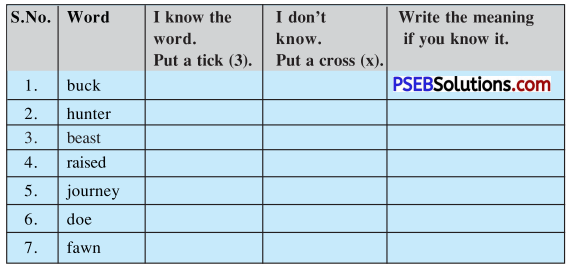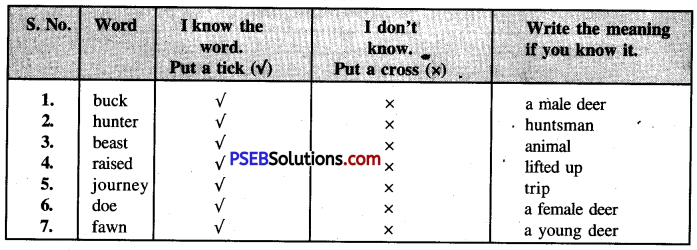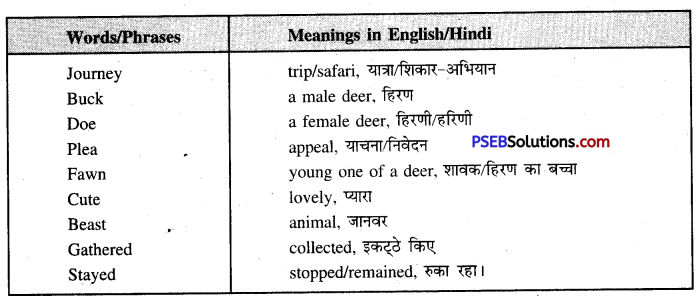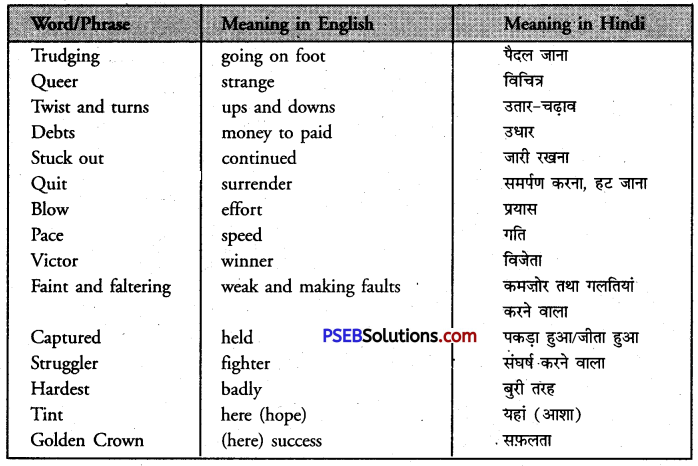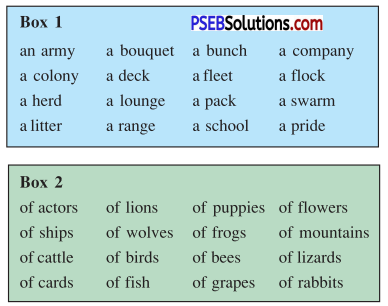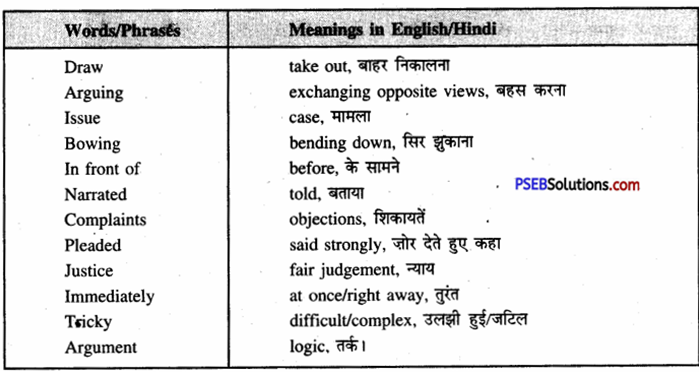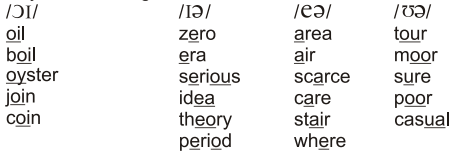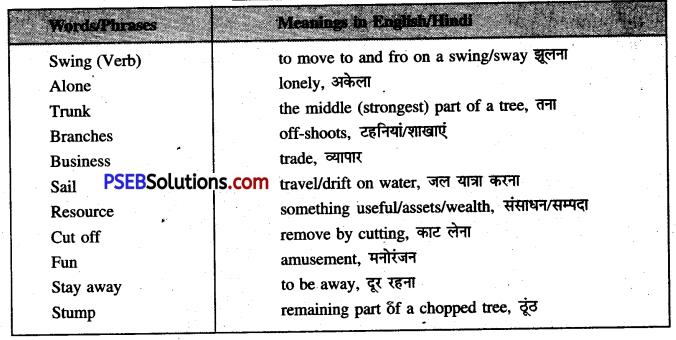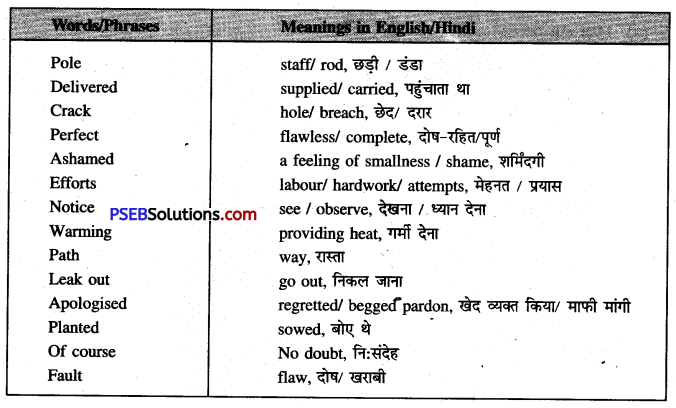Punjab State Board PSEB 10th Class English Book Solutions English Literature Book Chapter 3 One Thousand Dollars Textbook Exercise Questions and Answers.
Class 10th English Literature Book Chapter 3 One Thousand Dollars Question Answers
One Thousand Dollars Class 10 Questions and Answers
Question 1.
Who gave $ 1,000 to Robert Gillian ? Who did the money belong to ? Why was it given to him ?
Answer:
Lawyer Tolman gave the money to Robert Gillian. This money belonged to Gillian’s uncle. Robert was asked to spend the amount and then give an account of how he had spent it.
वकील टॉलमैन ने राबर्ट गिलियन को यह पैसे दिए। ये पैसे गिलियन के अंकल के थे। उससे कहा गया कि वह इस पैसे को खर्च करे और फिर इस बात का ब्योरा दे कि उसने ये पैसे कैसे खर्च किए थे।
![]()
Question 2.
Why was Bobby Gillian not happy with the money given to him ?
Answer:
Bobby Gillian was the only heir of his uncle’s property. This property was worth half a million dollars. But Bobby got only one thousand out of it. Naturally, he was not happy.
बॉबी गिलियन अपने अंकल की धन-दौलत का एकमात्र वारिस था। यह सम्पत्ति पांच लाख डॉलर की थी। परन्तु बॉबी को इसमें से केवल एक हज़ार मिले। स्वाभाविक रूप से वह खुश नहीं था।
Question 3.
What was the condition laid down by the lawyer ?
Answer:
The lawyer asked Bobby to spend the one thousand dollars and then give an account of how he had spent it. Only then the full contents of the will could be shown to him.
वकील ने बॉबी से कहा कि वह एक हज़ार डॉलर खर्च कर ले और फिर इस बात का ब्योरा दे कि उसने ये कैसे खर्च किए थे। केवल तभी वसीयत का पूरा ब्योरा उसे बताया जा सकता था।
Question 4.
Who else got the money and how much ?
Answer:
The others who got the money were the butler, the housekeeper and Miss Hayden who was the ward of Robert’s uncle. Each of them got ten dollars.
अन्य लोग जिन्हें पैसे मिले. वे थे – खानसामा, घर का नौकर और मिस हेडन जो राबर्ट के अंकल की एक आश्रिता थी। उनमें से प्रत्येक को दस डॉलर मिले।
![]()
Question 5.
Why was Old Bryson not serious in giving suggestions to Gillian ? What were the suggestions given ?
Answer:
Old Bryson did not like Gillian. Therefore, he was not serious in giving his suggestions. He suggested that Gillian could buy a house, provide milk for babies, spend in art galleries, spend for someone’s education, or buy a diamond pendant for Miss Lotta.
ओल्ड बायसन गिलियन को पसन्द नहीं करता था। इसलिए वह सुझाव देने के प्रति गम्भीर नहीं था। उसने सुझाव दिया कि गिलियन एक मकान खरीद सकता था, बच्चों के लिए दूध प्रदान कर सकता था, आर्ट गैलरियों में खर्च कर सकता था, किसी की शिक्षा पर खर्च कर सकता था, अथवा मिस लौटा के लिए हीरों का हार खरीद सकता था।
Question 6.
Which suggestion did Gillian accept? What did he do then ?
Answer:
Gillian accepted the suggestion to give a diamond pendant to Miss Lotta. He phoned for a cab, and asked the driver to take him to the Columbine Theatre.
गिलियन ने मिस लौटा को हीरों का हार देने का सुझाव स्वीकार कर लिया। उसने एक बग्घी के लिए फोन किया और चालक से कहा कि वह उसे कोलम्बाइन थियेटर ले चले।
Question 7.
Who was Miss Lotta Lauriere ? Did she welcome Gillian’s coming ? Was she happy with his offer ? Give reasons for your answer.
Answer:
Miss Lotta was an actress. She did not welcome Gillian’s coming. She was not happy with Gillian’s offer. She wanted a much costlier pendant.
मिस लौटा एक अभिनेत्री थी। उसने गिलियन के आने का स्वागत न किया। उसे गिलियन की पेशकश पर प्रसन्नता न हुई। वह इससे कहीं अधिक कीमत का हार चाहती थी।
Question 8.
What did Gillian ask the driver of the cab ? Did he like his answer ? How do you know ?
Answer:
Gillian asked the cab driver what he would do if he had a thousand dollars. The driver said that he would open a saloon. At this Gillian said, “Oh, no.” It shows that he did not like the cab driver’s answer.
गिलियन ने बग्घी-चालक से पूछा कि यदि उसके पास एक हजार डॉलर होते तो वह क्या करता। चालक ने उत्तर दिया कि वह एक शराबखाना खोल लेता। इस पर गिलियन ने कहा, “अरे, नहीं।” इससे पता चलता है कि उसे बग्घी-चालक का उत्तर पसन्द न आया।
Question 9.
Who did Gillian talk to next ? Why ?
Answer:
Gillian next talked to a blind man, who was selling pencils. He wanted to know from him what he would do if he had a thousand dollars.
इसके बाद गिलियन ने एक अन्धे आदमी से बात की जो पेन्सिलें बेच रहा था। वह उससे जानना चाहता था कि वह क्या करता यदि उसके पास एक हज़ार डॉलर होते।
![]()
Question 10.
Why did Gillian give his money to Miss Hayden ? What did he ask her to give him and why ?
Answer:
Gillian gave his money to Miss Hayden because he wanted to spend the money in a lump and save himself the trouble of keeping accounts. He asked Miss Hayden to give him a piece of paper to write a note.
गिलियन ने अपने पैसे मिस हेडेन को इसलिए दे दिए क्योंकि वह पूरे पैसे एक ही बार में खर्च करना चाहता था और स्वयं को हिसाब रखने की मुसीबत से बचाना चाहता था। उसने मिस हेडन से कागज़ का एक टुकड़ा कुछ लिखने के लिए मांगा।
Question 11.
What did Gillian write in his note ?
Answer:
He wrote that he had paid one thousand dollars to the best and dearest woman on earth. He added that it would give him eternal happiness.
उसने लिखा कि उसने एक हजार डॉलर धरती पर की सबसे बढ़िया और प्यारी औरत को दे दिए थे। उसने यह भी लिखा कि इससे उसे अनन्त प्रसन्नता प्राप्त होगी।
Question 12.
Why did Gillian go to the lawyers again ?
Answer:
He went to the lawyers to give them the account of how he had spent the one thousand dollars.
वह वकीलों के पास यह हिसाब देने गया कि उसने एक हजार डॉलर कैसे खर्च किए थे।
Question 13.
What had Gillian’s uncle written in the postscript of his will ?
Answer:
He had written that if Robert had spent the money wisely, he would get another five thousand dollars. Or else, this amount would go to Miss Hayden.
उसने लिखा था कि यदि राबर्ट ने पैसे समझदारी से खर्च किए तो उसे पाँच हजार डॉलर और मिल जाएंगे। अन्यथा ये पैसे मिस हेडन को मिल जाएंगे।
Question 14.
Why did Gillian not get the rest of the money ? Was he sorry for his action ?
Answer:
Gillian told the lawyers falsely that he had lost the thousand dollars on the races. Thus he lost his right to the other five thousand dollars. But he was not at all sorry for it. Rather he was happy that the money would go to the lady he loved so much.
गिलियन ने वकीलों को झूठ ही कह दिया कि वह एक हज़ार डॉलर घुड़दौड़ों में हार गया था। इस प्रकार वह अन्य पांच हज़ार डॉलर पर अपना अधिकार खो बैठा। किन्तु उसे उस बात का बिल्कुल कोई खेद नहीं था। इसके विपरीत उसे तो खुशी थी कि पैसे उस औरत को मिल जाएंगे जिसे वह इतना प्यार करता था।
Objective Type Questions
Question 1.
Robert lost the money on races.(True/False)
Answer:
True
Question 2.
To whom did Bobby Gillian give his one thousand dollars ?
(i) Butler
(ii) Miss Hayden
(iii) Lawyers
(iv) Miss Lotta Lauriere.
Answer:
(ii) Miss Hayden
Question 3.
Robert Gillian offered a ……………. to Miss Lotta Lauriere.
Answer:
pendant worth one thousand dollars
![]()
Question 4.
Robert Gillian received one million dollars from his uncle’s will. (True/False)
Answer:
False
Question 5.
The blind man was selling …………. on the walkside.
(i) books
(ii) pencils
(iii) pens
(iv) notebooks.
Answer:
(ii) pencils
Question 6.
Who was Miss Lotta Lauriere ?
Answer:
She was an actress.
Answer each of the following in one word / phrase / sentence :
Question 1.
Who wrote the story, ‘One Thousand Dollars’?
Answer:
O’Henry.
Question 2.
From where did Robert Gillian receive one thousand dollars ?
Answer:
From his uncle’s will.
Question 3.
What was the condition with the money which Gillian had received from his uncle’s will ?
Answer:
He had to spend that money sensibly.
Question 4.
Who was Miss Lotta Lauriere ?
Answer:
She was an actress.
Question 5.
What did Robert Gillian offer Miss Lotta ?
Answer:
He offered her a pendant worth one thousand dollars.
Question 6.
What did Gillian ask the cab driver ?
Answer:
He asked the cab driver what he would do if he had a thousand dollars.
Question 7.
What did Gillian want to ask the blind man who was selling pencils ?
Answer:
He wanted to ask the blind man what he would do if he had a thousand dollars.
Question 8.
What did Gillian ask Miss Hayden to give him ?
Answer:
A piece of paper to write a note.
Question 9.
Why did Robert Gillian go to the lawyers again ?
Answer:
To give them the account of how he had spent one thousand dollars.
Question 10.
Who got the rest of the money, i.e. five thousand dollars ?
Answer:
Miss Hayden.
Complete the following :
1. Robert Gillian was the only heir of …………..
2. …….. was the ward of Robert’s uncle.
3. Gillian asked the cab driver to take him to
4. The property of Gillian’s uncle was worth ……………..
5. Gillian accepted the suggestion to give ……………….. to Miss Lotta.
6. ….. said that he would open a saloon if he had one thousand dollars.
Answer:
1. his uncle’s property
2. Miss Hayden
3. the Columbine Theatre
4. half a million dollars
5. a diamond pendant
6. The cab driver.
Write True or False against each statement :
1. Gillian told the lawyers that he had lost the thousand dollars on the races.
Answer:
True
2. Miss Lotta was happy with Gillian’s offer.
Answer:
False
3. Miss Hayden worked at the Columbine Theatre as an actress.
Answer:
False
![]()
4. Gillian lost his right to other five thousand dollars.
Answer:
True
5. Robert’s uncle had a ward named Miss Lotta.
Answer:
False
6. Bobby was the only heir of his father’s property.
Answer:
False
Choose the correct option for each of the following :
Question 1.
Who gave ten thousand dollars to Robert Gillian ?
(a) Lawyer Tolman.
(b) Miss Heydan.
(c) Old Bryson.
(d) Miss Lotta.
Answer:
(a) Lawyer Tolman.
Question 2.
Miss Hayden was ……….
(a) Gillian’s beloved
(b) Miss Lotta’s sister
(c) Bryson’s wife
(d) Tolman’s client.
Answer:
(a) Gillian’s beloved
Question 3.
What was Robert’s nickname ?
(a) Tony.
(b) Robin.
(c) Harry.
(d) Bobby
Answer:
(d) Bobby
Question 4.
Old Bryson did not like ……
(a) Robert’s uncle
(b) Robert Gillian
(c) Lawyer Tolman
(d) Miss Hayden.
Answer:
(b) Robert Gillian
Question 5.
Old Bryson suggested that Gillian could
(a) buy a house
(b) spend in art galleries
(c) spend for someone’s education
(d) all of these three.
Answer:
(d) all of these three.
One Thousand Dollars Summary & Translation in English
One Thousand Dollars Introduction:
Robert Gillian receives one thousand dollars from his uncle’s will. But there is also a condition. He has to spend this money sensibly. He goes to Old Bryson for his advice. But Bryson is in no mood of giving him any advice. He talks to Gillian in a satirical tone. Robert offers Miss Lotta Lauriere to buy her a pendant worth one thousand dollars.
But she wants a much more expensive one. He asks a cab driver what he would do with a thousand dollars. He replies that he will open a saloon with it. Robert’s uncle had a ward, Miss Hayden. Perhaps Robert loves her. He gives the entire amount to her and makes a detail about it. Then he goes to the office of his uncle’s lawyers. He tells them that he has spent the money.
They tell him if he has spent the money sensibly, he would get another 5,000 dollars otherwise this amount will go to Miss Hayden. Hearing this, Robert Gillian tears the account of spending money. He tells the lawyers that he has lost the entire money on races. Saying this he leaves the office.
One Thousand Dollars Summary & Translation in Hindi
One Thousand Dollars Introduction:
राबर्ट गिलियन को अपने अंकल की वसीयत से एक हजार डॉलर मिलते हैं। परन्तु वहां एक शर्त भी है। उसे यह पैसे समझदारी से खर्च करने हैं। वह ओल्ड बायसन के पास उसकी सलाह लेने के लिए जाता है। परन्तु ब्रायसन कोई सलाह देने के मूड में नहीं है। वह गिलियन से व्यंग्यात्मक ढंग से बात करता है। राबर्ट मिस लौटा लौरियर को एक हजार डॉलर का एक हार खरीद कर देने की पेशकश करता है। परन्तु वह इससे काफ़ी अधिक महंगा चाहती है। वह एक बग्घी-चालक से पूछता है कि वह एक हजार डॉलर से क्या करेगा। वह कहता है कि वह इससे एक शराबखाना खरीदेगा।
राबर्ट के अंकल पर आश्रित एक लड़की थी, मिस हेडन। शायद राबर्ट उससे प्यार करता है। वह सारा पैसा उसे दे देता है और इसका विवरण बना देता है। इसके बाद वह अपने अंकल के वकीलों के दफ्तर में जाता है। वह उन्हें बताता है कि उसने पैसे खर्च कर दिए हैं। वे उसे बताते हैं कि यदि उसने पैसे समझदारी से खर्च किए हैं तो उसे और भी 5,000 डॉलर मिलेंगे अन्यथा यह पैसे मिस हेडन को मिल जाएंगे। यह सुन कर राबर्ट गिलियन पैसे खर्च करने वाला लेखा फाड़ डालता है। वह कहता है कि वह सारे पैसे घुड़दौड़ों में हार गया है। यह कह कर वह दफ्तर छोड़कर चला जाता है। कठिन शब्दार्थ तथा सम्पूर्ण कहानी का हिन्दी अनुवाद
![]()
One Thousand Dollars Summary & Translation in Hindi:
(Page 18-19)
“One thousand dollars,” ……………. a thousand dollars pour
Word-meanings :
1. solemnly-गम्भीरतापूर्वक; 2. severely-कठोरता से, रूखे ढंग से; 3. details –ब्यौरा; 4. comply with-का पालन करना; 5. thrust-घुसा देना, ठूसना; 6. calm-शांत स्वभाव वाला; 7. sighed-लंबी सांस ली; 8. laid down-रख दी; 9. wake up-ध्यान से सुनो। 10. usual—सामान्य, साधारण।
अनुवाद- “एक हज़ार डॉलर,” वकील टॉलमैन ने गम्भीरतापूर्वक और रूखे ढंग से दोहराया, “और यह रही रकम।” __ युवा गिलियन हंस दिया जब उसने एक डॉलर वाले नोटों की गड्डी को छुआ। “यह तो इतनी छोटी-सी रकम है,” उसने वकील से कहा।
“तुमने अपने चाचा की वसीयत पढ़ने के वक्त सब-कुछ सुना था,” वकील टॉलमैन ने एक रूखे स्वर में कहना जारी रखा। “मैं नहीं जानता कि तुमने वसीयत की छोटी-छोटी बातों पर गौर किया था या नहीं। मैं तुम्हें बता दूं कि तुम्हें इन एक हज़ार डॉलरों के खर्च करने के तरीके का पूरा ब्यौरा देना होगा, जैसे ही तुम उन्हें खर्च कर · चुके होगे। मुझे विश्वास है कि तुम स्वर्गीय मिस्टर गिलियन की इच्छाओं का पालन करोगे।” ___ “आप भरोसा रखिए,” उस जवान आदमी ने नम्रतापूर्वक कहा, “परन्तु मुझे शायद एक सेक्रेटरी रखना पड़े। मैं हिसाब-किताब में कभी भी कुशल नहीं था।” गिलियन ने नोटों की गड्डी को अपनी जेब में ढूंसा और क्लब चला गया। वहां वह उस व्यक्ति को ढूंढने लगा जिसे वह ओल्ड ब्राइसन कह कर बुलाता था।
ओल्ड ब्राइसन एक शांत स्वभाव वाला चालीस वर्ष का व्यक्ति था। वह एक कोने में बैठा हुआ एक किताब पढ़ रहा था और जब उसने गिलियन को आते देखा तो उसने लम्बी सांस ली, अपनी किताब नीचे रख दी और अपना चश्मा उतार दिया।
“ओल्ड ब्राइसन, ध्यान से सुनो,’ गिलियन बोला, “मेरे पास तुम्हें सुनाने के लिए एक हास्य-जनक कहानी है।”
“मेरी इच्छा है कि तुम अपनी कहानी बिलियर्ड रूम में किसी को सुनाओ, गिलियन,” ओल्ड ब्राइसन ने कहा।
“यह कहानी उन सामान्य कहानियों से बेहतर है,” गिलियन कागज़ से एक सिगरेट बनाते हुए बोला, “और मैं तुम्हें ही सुनाने जा रहा हूं। यह इतनी दुःखदायी और (साथ में) हास्यजनक है कि खेलते हुए इसे नहीं सुना जा सकता। मैं अभी-अभी अपने चाचा के वकीलों के कार्यालय से आया हूं। मेरे चाचा ने (वसीयत में) मेरे लिए एक हजार डॉलर छोड़े हैं। अब, कोई व्यक्ति केवल एक हजार डॉलरों से संभवतया क्या कर सकता है?”
(Page 19-20)
thought;” ………….. in a ranch.”
Word-meanings : 1. was worth-की हैसियत थी; 2. microbe – जीवाणु; 3. bacillus – जीवाणु; 4. rest-बाकी बचा; 5. doing away—मार डालने के लिए; 6. butler-खानसामा, रसोइया; 7. housekeeper-घर की देखरेख करने वाला; 8. seal ring – मोहर लगाने वाली अंगूठी; 9. fairy godmother – बहुत कृपालु और खुले दिल वाला व्यक्ति; 10. allowance खर्चे के लिए दिया गया पैसा; 11. heir-उत्तराधिकारी, वारिस; 12. frowned-भौंहें टेढ़ीं की; 13. ward-ऐसा व्यक्ति जो किसी के संरक्षण में हो; 14. offensive अपमान करने वाला; 15. art gallery-कला दीर्घा; 16. ambitious – महत्त्वाकांक्षी; 17. moralise-उपदेश देना; 18. gentle laugh-हल्की हंसी; 19. sensible-समझदारी वाली; 20. pendant- (हार की) लटकन; 21. ranch-एक बड़ा फार्म जहां गाएं-भैंसें, भेड़ें, इत्यादि पाले जाते हैं।
अनुवाद- “मैं तो सोचता था,” ओल्ड ब्राइसन बोला, “कि स्वर्गीय सैप्टिमस गिलियन की हैसियत लगभग पांच लाख डॉलरों की थी।” “बिल्कुल थी,” गिलियन ने प्रसन्न स्वर में कहा, “और यहीं वह हास्य-जनक बात आती है। वह अपनी लगभग सारी दौलत को एक जीवाणु के लिए छोड़ गया है। मतलब यह कि उसकी वसीयत का कुछ हिस्सा उसे मिलेगा जो एक नया जीवाणु खोजेगा और बाकी का सारा धन उस अस्पताल को जाएगा जो उस जीवाणु को मारने में समर्थ होगा। खानसामा और घर की देखभाल करने वाले को एक-एक मोहर लगाने वाली अंगूठी और दस डॉलर मिलेंगे। उसके भतीजे को (केवल) एक हज़ार डॉलर मिले हैं।”
“तुम्हारे पास तो हमेशा ही खर्च करने के लिए बहुत सारे पैसे रहे हैं,” ओल्ड ब्राइसन ने कहा।
“हां, हां, कई टन,” गिलियन बोला। “चाचा जी बहुत कृपालु और खुले दिल वाले थे जहां तक खर्चा-पानी देने का सम्बन्ध है।”
“कोई अन्य वारिस?” ओल्ड ब्राइसन ने पूछा।
“कोई भी नहीं,” गिलियन ने भौंहों पर बल डालते कहा और बेचैनी से दीवान को ठोकर लगा दी। “एक मिस हेडन है, मेरे चाचा के संरक्षण में रहने वाली एक लड़की, जो घर में ही रहा करती थी। मैं तुम्हें बताना भूल गया कि उसे भी एक मोहर लगाने वाली अंगूठी और दस डॉलर मिले हैं। कैसी मज़े वाली बात है ! अपमान न करना, ओल्ड ब्राइसन – बताओ कि कोई व्यक्ति एक हजार डॉलर से क्या कर सकता है?”
ओल्ड ब्राइसन ने अपने चश्मे को साफ़ किया और मुस्करा दिया। और जब वह मुस्कराया तो गिलियन को विश्वास हो गया कि वह पहले से भी ज्यादा अपमान-जनक बनने वाला था। “एक हज़ार डॉलर,” उसने कहा, “का अर्थ कम या ज्यादा दोनों ही है। कोई इतनी रकम से एक अच्छासा घर खरीद सकता है। एक हजार डॉलर जून, जुलाई और अगस्त में एक सौ बच्चों के लिए शुद्ध दूध खरीदने में समर्थ होंगे और उनमें से पचास बच्चों के जीवन की रक्षा कर सकेंगे। किसी कला दीर्घा में आप आधे घण्टे का मौज-मज़ा ले सकते हैं। इससे किसी महत्त्वाकांक्षी लड़के को शिक्षा मिल सकेगी। तुम न्यू हैंपशायर के किसी नगर में जाकर रह सकते हो और इतने पैसों में दो साल तक सम्मानपूर्वक रह सकते हो।”
“लोग तुम्हें पसन्द करने लगेंगे अगर तुम उपदेश देना बन्द कर दो। मैंने सिर्फ तुमसे यह बताने के लिए कहा था कि मैं उन एक हजार डॉलर से क्या कर सकता हूं,” गिलियन ने कहा। “तुम?” ओल्ड ब्राइसन ने हल्की हंसी के साथ कहा। “हां तो बॉबी गिलियन, सिर्फ एक ही समझदारी वाला काम है जो तुम कर सकते हो। तुम मिस लौटा लौरियर को हीरों की एक लटकन खरीद कर दे सकते हो और अपना बाकी का समय तुम किसी पशु-फ़ार्म में बिता सकते हो। मैं इसलिए तुम्हें भेड़ों के फ़ार्म की सलाह दे रहा हूं क्योंकि मुझे भेड़ें बिल्कुल अच्छी नहीं लगती।”
![]()
(Page 20)
“Thanks,” ………………. he told the driver.
Word-meanings : 1. lump—एकमुश्त; 2. cab-टैक्सी या किराए की कोई अन्य बग्घी; 3. let him in—उसे अन्दर ले आओ; 4. perform-प्रदर्शन करना; 5. cipher-शून्य; 6. saloon-मधुशाला, शराबखाना; 7. curiosity–उत्सुकता; 8. sidewalk —पटरी, फुटपाथ।
अनुवाद- “धन्यवाद,’ गिलियन ने उठते हुए कहा। “मैंने सोचा था कि मैं तुम पर भरोसा कर सकता हूं, ओल्ड ब्राइसन। तुमने मुझे सही सलाह दी है। मैं पैसों को एकमुश्त खर्च करना चाहता था। अब कोई विस्तृत हिसाब-किताब रखने की कोई ज़रूरत नहीं है। मैं वैसा करना सख़्त नापसन्द करता हूं।”
गिलियन ने फोन करके एक टैक्सी बुलवाई और ड्राइवर को कोलंबाइन थियेटर चलने को कहा। मिस लौटा लौरियर शो के लिए लगभग पूरी तरह तैयार थी जब वस्त्र-सज्जा करने वाली स्त्री ने मिस्टर गिलियन के आने की सूचना दी। “उसे अन्दर ले आओ,” मिस लौरियर ने कहा। “अब क्या बात है, बॉबी?” उसने बोर होते हुए कहा। “मैं दो मिनट में प्रदर्शन करने वाली हूं।”
“मैं दो मिनट भी नहीं लूंगा,” गिलियन बोला। “एक लटकन के विषय में तुम्हारा क्या विचार है? मैं तीन शून्यों के पहले एक अंक लगाने जितनी रकम कर सकता “ओह, जैसा तुम कहो। बॉबी, क्या तुमने वह हार देखा था जो उस रात को डैला स्टैसी ने पहना हुआ था? वह दो हज़ार दो सौ डॉलर में आया था,” वह बोली। और वह अपने प्रदर्शन के लिए चली गई। गिलियन टैक्सी की तरफ़ गया। “तुम क्या करते अगर तुम्हारे पास एक हज़ार डॉलर होते?” उसने ड्राइवर से पूछा। “मैं तो एक शराब-घर खोल लेता,” ड्राइवर ने झट से जवाब दिया। “मैं दोनों हाथों से पैसा बनाता। क्या तुम सोच रहे हो
“ओह, नहीं,” गिलियन ने कहा, “मैंने केवल उत्सुकतावश पूछा था। चलो, चलते रहो, जब तक मैं तुम्हें रुकने को न कहूं।”
ब्राडवे पर आठ ब्लाक आगे, गिलियन ने पटरी पर एक अन्धे आदमी को पैंसिलें बेचते हुए देखा। गिलियन टैक्सी में से बाहर निकला ओर उसके सामने खड़ा हो गया।
“क्षमा करना,” उसने कहा, “लेकिन मुझे बताओ कि तुम क्या करते अगर तुम्हारे पास एक हजार डॉलर होते?”
“क्या आप अभी-अभी टैक्सी से उतरे हैं? ज़रा इस पर नजर डालिए, अगर आप – पसन्द करें,” उस अन्धे आदमी ने कहा और अपनी जेब से एक छोटी-सी किताब निकाली। गिलियन ने उसे खोला और पाया कि वह बैंक की एक पास-बुक थी। पास-बुक के अनुसार अन्धे आदमी के खाते में 1785 डालर जमा थे। गिलियन ने पास-बुक वापस की और टैक्सी में बैठ गया। “टॉलमैन एन्ड शार्प, ब्राडवे चलो,” उसने ड्राइवर से कहा।
(Page 21)
“I beg your ……. Tolman & sharp.
Word-meanings : 1. cheerful —प्रसन्नतापूर्ण; 2. slender-दुबली-पतली, छरहरी; 3. postscript-अनुलेख; 4. loosened a bit-थोड़ा नर्म पड़ा; 5. light-heartedly-खुशमिजाज़ी से; 6. bowed-सिर झुकाया। __ अनुवाद- “क्षमा कीजिएगा,” गिलियन ने प्रसन्नतापूर्ण स्वर में कहा, “किन्तु क्या मैं एक प्रश्न पूछ सकता हूं? मुझे आशा है कि आप बुरा नहीं मानेंगे। क्या मिस हेडन को मेरे चाचा जी की वसीयत में अंगूठी और दस डॉलर के अलावा भी कुछ मिला था?”
“नहीं, कुछ नहीं,” मिस्टर टॉलमैन ने कहा। “आपका बहुत-बहुत धन्यवाद है, श्रीमान,” गिलियन ने कहा और बाहर निकल कर टैक्सी में बैठ गया।
जब गिलियन अपने चाचा के घर पहुंचा तो मिस हेडन लाइब्रेरी में बैठकर पत्र लिख रही थी। वह छोटे कद की दुबली-पतली स्त्री थी और उसने (शोक-सूचक) काले वस्त्र पहने हुए थे। “मैं अभी-अभी टॉलमैन के कार्यालय से आया हूं,” उसने कहा। “उन्हें वसीयत में हस्ताक्षरों के बाद लिखा हुआ एक सन्देश मिला है। ऐसा लगता है कि चाचा जी दुबारा सोच-विचार करने के बाद थोड़े नर्म पड़े और आपके नाम एक हज़ार डॉलर की . वसीयत और कर दी। क्योंकि मैं इधर से गुजर रहा था, टॉलमैन ने मुझे वह पैसे आपको देने को कहा।
यह रहे पैसे।” गिलियन ने पैसे मेज़ पर रख दिए। मिस हेडन सफ़ेद पड़ गई। “ओह! मुझे अफ़सोस है,” पैसे उठाते हुए मिस हेडन ने कहा। “मुझे अफ़सोस है,” उसने दुबारा कहा। “क्या इसका कोई फायदा नहीं है?” गिलियन ने लगभग खुशमिजाजी से कहा। “क्या मैं एक नोट लिख सकता हूं?” गिलियन ने एक मुस्कराहट के साथ पूछा। मिस हेडन ने उसे एक पन्ना दिया और फिर से अपने काम में व्यस्त हो गई। गिलियन ने अपने एक हजार डॉलर के खर्च के ब्यौरे के तौर पर यह शब्द लिख दिए“अपने परिवार के एक कलंक, रॉबर्ट गिलियन, द्वारा एक हजार डॉलर, अमर प्रसन्नता के लिए पृथ्वी की सर्वोत्तम और प्रियतम् स्त्री को दिए गए।” गिलियन ने अपने लिखे को एक लिफ़ाफ़े में सरकाया, सिर झुकाया और अपने रास्ते चला गया। – उसकी टैक्सी टॉलमैन एण्ड शार्प के कार्यालय पर रुकी।
(Page 21-22)
“I have spent ………………… room whistling.
Word-meanings : 1. slipped-सरकाया; 2. tossed-उछाल दिया, फेंका; 3. bequest-उत्तराधिकार में मिला; 4. gist-सारांश; 5. examine-जांच करना; 6. in regard to-के सम्बन्ध में; 7. bother -परेशान करना; 8. disgust-विरुचि, घृणा।
अनुवाद- “मैंने एक हजार डॉलर खर्च कर दिए हैं,” उसने प्रसन्नतापूर्ण स्वर में मिस्टर टॉलमैन से कहा, “और मैं आप को हिसाब देने आया हूं।” उसने लिफ़ाफे को मेज़ पर फेंक दिया। लिफ़ाफे को छुए बिना मिस्टर टॉलमैन दरवाज़े की तरफ़ गया और उसने साझीदार, शार्प, को बुलाया। दोनों आपस में किसी चीज़ के बारे में विचार-विमर्श करते रहे। अन्त में मिस्टर टॉलमैन ने कहा, “मिस्टर गिलियन, आप के चाचा ने एक और लिफ़ाफा भी रखवाया था जिसे आपको उत्तराधिकार में मिले एक हज़ार डॉलर के खर्च का आप के द्वारा हिसाब दे दिए जाने के बाद खोलने का निर्देश दिया गया था।
क्योंकि आप ने हिसाब दे दिया है, मेरे साझीदार और मैंने उस लिफ़ाफ़े में लिखे हुए को पढ़ लिया है। हम आप को विस्तार में नहीं बताएंगे। परन्तु उसका सारांश यह है कि अगर आपने वे एक हजार डॉलर अक्लमंदी से खर्च किए हैं तो हमें आपके लिए रखे गए पांच हज़ार डॉलर की रकम को आप को दे देने का अधिकार है। परन्तु यदि आपने उस रकम को उसी तरह खर्च किया है जिस तरह आप अतीत में करते थे तो वे पांच हजार डॉलर मिरियम हेडन, स्वर्गीय मिस्टर गिलियन के संरक्षण में पलने वाली वह लड़की, को दे दिए जाएंगे।
![]()
अब, मिस्टर गिलियन, अब हम उन हजार डॉलर के खर्चे के हिसाब की जांच करेंगे।” मिस्टर टॉलमैन ने अपना हाथ उस लिफ़ाफे की तरफ़ बढ़ाया। गिलियन ने उससे भी ज्यादा तेज़ी दिखाकर लिफ़ाफे को उठा लिया। उसने उस हिसाब को तथा लिफ़ाफ़े को फाड़ डाला और उन चिंदियों को अपनी जेब में डाल लिया। “कोई बात नहीं,” उसने मुस्करा कर कहा, “आप को इसके द्वारा परेशान होने की कोई ज़रूरत नहीं है। कुछ भी हो, मैं उन एक हज़ार डॉलरों को घुड़दौड़ में गंवा चुका हूं। नमस्कार, सज्जनो।” टॉलमैन तथा शार्प ने घृणा में अपने सिर हिलाए और एक-दूसरे की तरफ़ देखा, और उन्होंने गिलियन को सीटी बजाते हुए कमरे से बाहर जाते हुआ सुना।
Class 10th English Literature Book PSEB Supplementary Reader

